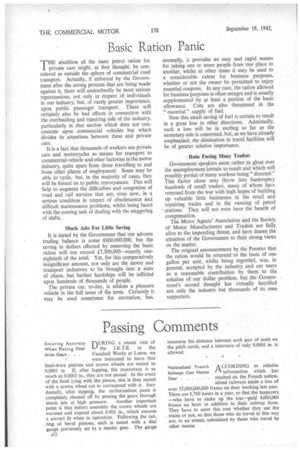Basic Ration Panic
Page 24

If you've noticed an error in this article please click here to report it so we can fix it.
THE abolition of the basic petrol ration fot private cars might, at first thought, be considered as outside the sphere of commercial road transport. Actually, if enforced by the Government after the strong protests that are being made against it, there will undoubtedly be most serious repercussions, not only in respect of individuals in our industry, but, of vastly greater importance, upon public passenger transport. There will certainly also be bad effects in connection with the overhauling and repairing side of the industry, particularly in that section which does not concentrate upon commercial vehicles but which divides its attentions between these and private cars.
It is a fact that thousands of workers use private cars and motorcycles as means for transport to commercial-vehicle and other factories in the motor industry, quite apart from those travelling to and from other places of employment. Some may be able to cycle, but, in the majority of cases, they will be forced on to public conveyances. This will help to augment the difficulties and congestion of road and rail services that are, even now, in a serious condition in respect of obsolescence and difficult maintenance problems, whilst being faced with the coming task of dealing with the staggering of shifts.
Much Ado For Little Saving It is stated by the Government that our adverse trading balance is some 000,000,000, but the saving in dollars effected by removing the basic ration will not exceed 0,500,000—exactly oneeightieth of the total. Yet, for this comparatively insignificant amount, not only are the motor and transport industries to be brought into a state of chaos, but further hardships will be inflicted upon hundreds of thousands of people.
The private car, to-day, is seldom a pleasure vehicle in the full sense of the term. Certainly it may be used sometimes for recreation, but, normally, it provides an easy and rapid means for taking one or more people from one place to another, whilst at other times it may be used to a considerable extent for business purposes, whether or not the owner be permitted to enjoy essential coupons. In any case, the ration allowed for business purposes is often meagre and is usually supplemented by at least a portion of the basic allowance. Cuts are also threatened in the " essential " supply of fuel.
Now this small saving of fuel is certain to result in a great loss in other directions. Admittedly, such a loss will be in sterling so far as the monetary side is concerned, but, as we have already emphasized, the diminution in travel facilities will be of greater relative importance.
Ruin Facing Many Traders Government speakers seem rather to gloat over the unemployment 'certain to result and which will possibly permit of many workers being "directed." This factor alone may throw into bankruptcy hundreds of small traders, many of whom have returned from the war with high hopes of building up valuable little businesses in the retail and repairing trades and in the running of petrol stations. They will not even have the benefit of compensation.
The Motor Agents' Association and the Society of Motor Manufacturers and Traders are fully alive to the impending threat, and have drawn the attention of the Government to their strong views on the matter.
The original announcement by the Premier that the ration would be returned to the basis of one gallon per unit, whilst being regretted, was, in general, accepted by the industry and car users as a reasonable contribution by them to the solution of our dollar problem, but the Government's second thought has virtually horrified not only the industrybut thousands of its own supporters.












































































